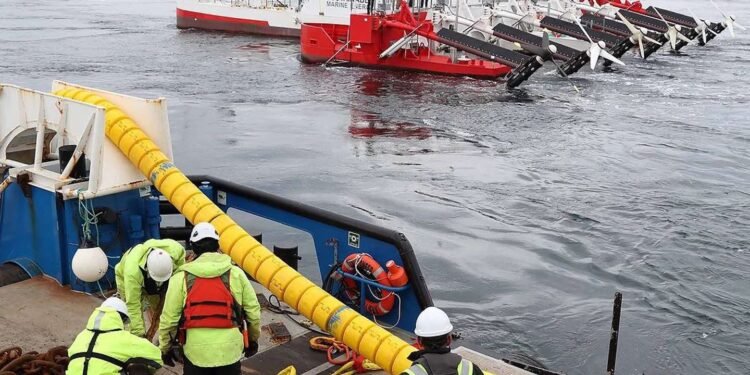Tidal developer Sustainable Marine Energy (SME) has been placed into administration, driven in part by the failure of its Canadian arm earlier this year.
The Edinburgh-based firm, which develops tidal energy systems, was placed into administration on Wednesday.
Energy Voice understands around 3 UK employees were made redundant as a result of the decision to cease trading.
Founded in 2012, SME develops renewable energy solutions, mainly in the form of tidal energy systems for island and coastal communities with the goal of providing cleaner and more sustainable power. It hosts offices in Spay, Germany, and Dartmouth in Nova Scotia.
Chief amongst its innovations is the floating in-stream tidal PLAT-I platform, variants of which have been deployed off the west coast of Scotland and in Canada.
Last June SME’s Canadian subsidiary successfully powered up an array in the Bay of Fundy, in Nova Scotia, making it the first to deliver in-stream tidal power to the grid in Canada.
The PLAT-I platform used six turbines mounted on its stern which used the flow of tidal waters to produce electricity.
At the time it said the 420kW PLAT-I 6.4 unit would eventually be re-located to the FORCE demonstration site in the Minas Passage to form part of the world’s first floating tidal energy array as part of the ‘Pempa’q Project’.
However, in May this year the Canadian business was placed into an insolvency process due to permitting issues with Fisheries and Oceans Canada (DFO), which resulted in the suspension of its operations in Canada.
Last year SME also sold its anchoring and mooring business, Swift Anchors, to a newly formed subsidiary of its largest shareholder and partner SCHOTTEL. The sale saw a number of staff transferred to the new subsidiary, according to annual filings submitted with Companies House.
Graeme Bain and Donald McNaught, of accountancy and business advisory firm Johnston Carmichael, have now been appointed as joint administrators.
Mr Bain, a restructuring director at the firm, said: “SME has been a leading developer of tidal energy solutions for several years and had demonstrated the value of that development through the successful implementation of its innovative PLAT-I platform in Canada.
“The difficult decision was made by the UK-based company to enter administration due to the impact caused by the recent insolvency of its Canadian subsidiary in May.
“In conjunction with our energy, infrastructure and sustainability team of sector experts, an assessment of the potential future viability of the current Canadian project will be undertaken and, with the potential for the application of its technology in other parts of the world, interest will also be sought for the company’s intellectual property in due course.”
It marks another disappointment for the marine energy sector, which has seen its fair share of growing pains with the high-profile collapse of firms such as Pelamis and Aquamarine power.
However further support – such as ring-fenced funding offered as part of the Contracts for Difference scheme – and the success of companies such as Orbital Marine Power suggest there is still cause for optimism.
Recommended for you




 © Supplied by Sustainable Marine
© Supplied by Sustainable Marine






